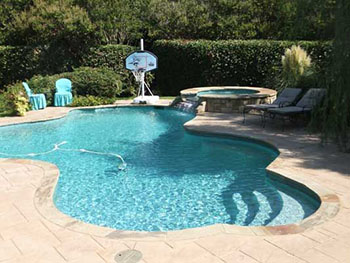
When that scorching Texas sun is beating down on you, nothing is more refreshing than jumping into a sparkling pool. However, in order for your family and friends to enjoy your pool to the fullest, it’s best to ensure you have the right equipment in place. And one of the most important pieces of equipment is the pump. In this post, we’ll discuss some key differences between a variable-speed pump and a single-speed pump, and we’ll demonstrate why a variable-speed pump is the best choice for any pool, spa, or water feature.
Energy Efficiency
Of course, energy efficiency should always be a top concern when discussing high-voltage equipment operating for hours each day. And when it comes to the differences between a single-speed pump and a variable option, the energy used changes dramatically. Variable-speed pumps allow users to program their pumps to operate at different speeds, whereas all single-speed pool pumps operate continuously at 3,450 rpm.
That being said, a variable speed pump saves you hundreds in electricity dollars each year. This is because the user is able to program lower speeds when needed, which greatly reduces the energy used. Even when operating at higher RPMs that mimic the horsepower of single-speed pumps, variable-speed pumps are by design at least 20% more energy efficient. Additionally, some energy companies even offer a rebate for people who use variable-speed pumps. While the initial cost of a variable-speed pump is typically higher, the amount of energy savings you can earn over time can be substantial.
Speed
Speed is another quality that varies quite a bit between a single-speed pump to a variable-speed pump. While both of these options will pump water at a high level, sometimes your pump doesn’t work very efficiently when it operates at max speed. High-horsepower, single-speed pumps can operate at higher flow rates than plumbing and filtration equipment will allow. This can damage components and waste electricity. Heater flow rates vary slightly, so that some work better with lower flow than others. Given how you need different speeds at different times, a variable-speed pump will most likely be better suited for your needs.
Automation
Another consideration to make regarding these pool pumps involves automation. When utilizing a variable-speed pump, the user is often able to integrate this pump into an advanced pool automation system. The user can then set times for the pump to run at different speeds at various times throughout the day. However, the user may also tweak until they find that one particular speed that maximizes pool surface skimming and chemical circulation, neither too fast nor too slow. While running your filter pump is vital to the health of your pool, now the process can be fine-tuned with the help of a variable-speed pump. On the other hand, a single-speed pump can only run at a predetermined speed that may not be right for the circulation system and certainly would be less efficient than modern technology.
Operating Noise
The truth of the matter is, pool pumps can be very loud. However, variable-speed pumps tend to run at a lower speed, making them quieter during operation. Additionally, they utilize a magnetic motor, similar to the one found in a hybrid car, which makes them inherently quieter, regardless of operating speed. On the other hand, there are some quieter single-speed pumps on the market today, but their operation sounds are usually much higher compared to a variable-speed option.
Synchronization
Another leading benefit of variable-speed pumps is that they work better with your water features and pool filtration systems. An attached hot tub requires higher speeds to create adequate therapeutic jet action, which can be dialed in on a variable speed pump for only the spa session. Some versions of pool cleaning equipment depend on filter pump flow rates, so variability of speeds can mean better-cleaned pool floors. Some pool owners with auxiliary water features may appreciate being able to adjust flow for the perfect visual and audio presentation of cascading water. When using a single-speed pump, you’re limited on the water flow these components receive. But with a variable-speed pump, the user can increase the water flow as needed and decrease the flow when the cleaner and spa are not in use.
Need a new variable-speed pump for your pool? Uncertain as to just how much better variable-speed pumps can be for your pool and your bank account? We have anecdotal evidence from existing customers and personal experience, as well as resources for calculating energy savings. From expert pump replacement to top-tier equipment repair, Select Pool Services is here for you! We are happy to serve those in North Dallas and the surrounding communities, and our customer service can’t be beat. Have more questions about variable and single-speed pumps? Want to schedule an appointment? No matter your pool care needs, contact us today!




No comments yet.